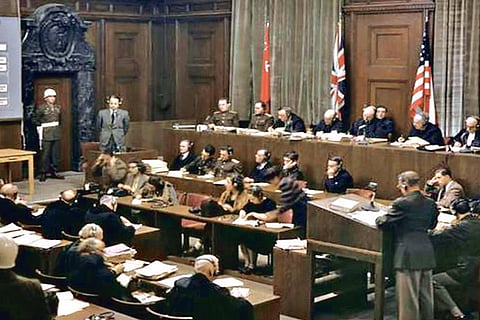

Chennai
Now Nuremberg, where the National Socialist German Workers’ Party once celebrated pompous rallies, was to become the scene of the party’s reckoning before the law: For wars of aggression, mass murders and twelve years of dictatorship. The victorious powers — the USA, the Soviet Union, Great Britain, and France — are setting up an International Military Tribunal for this purpose.
The main war crimes trial against 24 close followers of the dictator Adolf Hitler began on November 20. Powerful Nazi leaders who once dreamed of world domination were sitting on the wooden benches in courtroom 600 of the city’s Palace of Justice, largely chosen because it was one of the few unscathed buildings large enough, and with its own prison facility, to host such a trial. The defendants included Reich Marshal and Luftwaffe Commander-in-Chief Hermann Goring, Hitler’s temporary deputy Rudolf Hess and Foreign Minister Joachim von Ribbentrop. They were accused of crimes against peace, war crimes, crimes against humanity and conspiracy. Nazi organisations such as the Schutzstaffel SS or the Gestapo Secret State Police were also indicted — as “criminal organisations.” But the worst perpetrators were not on trial: Adolf Hitler, SS chief Heinrich Himmler and Reich propaganda leader Joseph Goebbels had committed suicide at the end of the war.
Justice instead of revenge
But the significance of the trial was vital: For the first time in human history, states with different forms of government and constitutions were holding leading representatives of a defeated enemy accountable for violations of international law.
In his opening speech, the US Chief Prosecutor Robert H. Jackson emphasized the historical dimension: “That four great nations, flushed with victory and stung with injury stay the hand of vengeance and voluntarily submit their captive enemies to the judgment of the law is one of the most significant tributes that power has ever paid to reason.”
The Allies also broke new ground with their definition of the charges. The concept of war crimes had already been established in the Geneva Conventions of 1864, but “crimes against humanity or the crime of war of aggression — crimes against peace, as it was still called in Nuremberg — had not existed before in that sense,” Christoph Safferling, professor for international law at the University of Erlangen-Nuremberg, told DW. “These criminal offenses were born in Nuremberg.”
A shock for all trial observers
There was an oppressive atmosphere during the trial. “Everyone was feeling tense. The atmosphere was very serious, quiet, and oppressive. You could hear the translators, you could feel the atmosphere loaded with shame,” said Renate Ronn, who accompanied her father Alfred Thoma, one of the defense attorneys, during the trial as his secretary.
Ronn said that at first, no one had known the dimension of the atrocities. But the evidence presented changed that. The court showed films of mountains of corpses from concentration camps like Auschwitz. “It was a shock,” remembers Ronn. “One could not imagine that such horrible atrocities could be committed in Central Europe and by a cultured people.” Almost all of the defendants denied the court’s authority, accusing it of being no more than “victor’s justice.” Even parts of the German population felt it was unjust, and there was criticism that Allied war crimes remained unpunished.
— This article has been provided by Deutsche Welle
Visit news.dtnext.in to explore our interactive epaper!
Download the DT Next app for more exciting features!
Click here for iOS
Click here for Android